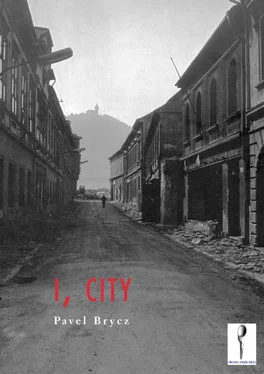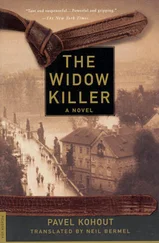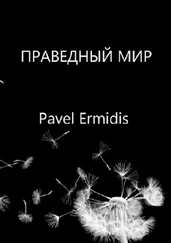Pavel Brycz - I, City
Здесь есть возможность читать онлайн «Pavel Brycz - I, City» весь текст электронной книги совершенно бесплатно (целиком полную версию без сокращений). В некоторых случаях можно слушать аудио, скачать через торрент в формате fb2 и присутствует краткое содержание. Год выпуска: 2006, Издательство: Twisted Spoon Press, Жанр: Современная проза, на английском языке. Описание произведения, (предисловие) а так же отзывы посетителей доступны на портале библиотеки ЛибКат.
- Название:I, City
- Автор:
- Издательство:Twisted Spoon Press
- Жанр:
- Год:2006
- ISBN:нет данных
- Рейтинг книги:5 / 5. Голосов: 1
-
Избранное:Добавить в избранное
- Отзывы:
-
Ваша оценка:
- 100
- 1
- 2
- 3
- 4
- 5
I, City: краткое содержание, описание и аннотация
Предлагаем к чтению аннотацию, описание, краткое содержание или предисловие (зависит от того, что написал сам автор книги «I, City»). Если вы не нашли необходимую информацию о книге — напишите в комментариях, мы постараемся отыскать её.
Dubliners
I, City
I, City — читать онлайн бесплатно полную книгу (весь текст) целиком
Ниже представлен текст книги, разбитый по страницам. Система сохранения места последней прочитанной страницы, позволяет с удобством читать онлайн бесплатно книгу «I, City», без необходимости каждый раз заново искать на чём Вы остановились. Поставьте закладку, и сможете в любой момент перейти на страницу, на которой закончили чтение.
Интервал:
Закладка:
“Thank you. Since Gala died, there’s been no woman really able to give me a rise.”
By then the painter already lay on his deathbed and wished very much for something to rouse him.
But memories of bulimia brought the girl images much more horrific than those of Dalí. In pain, she whimpered like a cat seven times whipped when a certain man cured her with his fists so that she wouldn’t lose her figure for the customers. She closed her eyes. In her palm, she still clenched her secret. She couldn’t leave; she had to ring at her parents’. It was Christmas Eve, and she needed a bit of love.
They opened: and they hadn’t grown older by even a hair.
Rather, they’d grown younger for this very moment. It was Christmas Eve, after all. Their daughter had been gone and now she’d come back. And her father wasn’t at all as severe as she remembered him from her childhood. And her mother was silent and attentive.
Is this my family? Have I rung at the house of strangers? Aren’t I asleep?
Really, she was very tired. She wanted to sleep and was glad her parents didn’t ask questions.
After so many years, she slept alone in her bed, having pulled off her pumps full of blood.
She was sleeping and her father and mother saw how her harsh expression melted away.
“Look, Mother, it’s our old little girl again,” whispered her father. “She’s not old, don’t you see, she’s growing younger right in front of our eyes!” her mother laughed.
And then the girl inadvertently let loose her fist and something fell from it and rolled on the floor. The father bent down and picked the thing up. It was mace. Father, Mother and I, city, stared at the canister of tear gas and we knew then that our daughter had definitely returned.
And that now she won’t make anyone cry.
AN APPEARANCE, DONKEY
As long as I’ve known him, that little donkey’s been an ass.
He loved cigarettes and grubbed them; everyone gave them to him.
He was a small donkey.
Maybe he wasn’t so stupid after all.
Maybe he was wiser than the Marlboro Man, the man from the ad.
Fact is, everyone wants to ride on horseback, and so thousands of children from Most have gone to, still go, and will always go to the horses kept at Svinčice.
And as long as that small donkey Ferda was around, he ate all their cigarettes. The children couldn’t light up so often, like the Marlboro Man on the horse. They could only every so often run away from the little donkey, make a small fire and light up the last cigarette they’d saved. And just from that one cigarette they got so sick that they told themselves, smacking their foreheads, “only a donkey could like this.” Next time, they gave him all their cigarettes. And so the little donkey was making a simpleton of himself solely for the sake of the children’s health, and only the tobacco concerns the world over would call him an ass.
He was a fox, that little old donkey!
AN APPEARANCE, INNOCENT
I knew a grandfather who didn’t want his grandson to get in with any bad company. He’s never gotten into any company at all. When he made love, he made love alone; on tennis courts he bounced a ball against a wall without end. When he grew up, he drank alone, and died totally alone, too.
It wasn’t his fault. The easiest thing in this modern world is not to fall in with any company whatsoever.
Though his grandfather didn’t know this. He lived and died in other times. He was a gardener, a volunteer fireman, philatelist, chess-player, and God knows what else. He knew the modern world only from pamphlets:
“How to Save Your Grandson from Bad Company.”
And I, city, who have never been a judge, today I will at least be the advocate of these boys when the world judges them. Forget the pamphlets, Pops!
These stupid pamphlets are named “How to Die Totally Alone” — I hope they’ve become outdated once and for all.
AN APPEARANCE, SINFUL
Sinful people are not only to be found in the city of Prague — believe me, we have enough of them here. For example, take Mr. Hřebejk: he never put on pants for a walk in the park.
Though he’d been a soldier. With iron discipline. Every morning he got up at six. And exercised.
In the park he performed the Parade-Marsch, executing turns as on a field day.
He looked good, a veteran from Buzuluk — if he had at least worn his underwear. How Mrs. Hřebejková tried to talk to him! But he never took a hint, just marched and marched, and only because he was shot in the head in that stupid war.
Or what about Mrs. Nováčková, that shameless slattern of a woman? She brought men into the apartment, so her husband dragged himself through the streets with his eyes fixed to the ground, as if hypnotizing the earth’s crust to swell up and swallow him, and didn’t reply to the salutes of his acquaintances, because he was ashamed, and at work at first he whispered until he fell totally silent, and in his building he got onto the elevator on principle from the cellar so that he wouldn’t have to meet fellow tenants on the ground floor — the man was that ashamed.
He was so ashamed that he would get lost not only in the cellar, but further underground. He would die of shame like old man Bovary, if something hadn’t suddenly happened. Waiting in front of the door to his apartment, in which his shameless wife had a visitor, he heard a desperate cry come from within and out ran his wife’s lover. In the bedroom, Mr. Nováček found Mrs. Nováčková with a knife in her heart.
Mr. Nováček spent six years in Bory prison.
It’s true that he served for another man, but no less than Sigmund Freud, the expert on the psyche, would tell you that a man taken among men as an avenger of infidelity is in their eyes still a man, and not a non-entity waiting for the elevator in the cellar or a doormat to be walked all over by the woman he loves.
And so you see, dear, it’s not only Prague that has its Dalibor. Mr. Nováček regained his voice and self-assurance. He advised those without sin how to cope with the sins of a sinful people.
But since people without sin don’t exist, he advised all. From time to time you can see him in the Park at the End of the Line, trotting alongside the marching Mr. Hřebejk. Two cracked old men on a walk.
AN APPEARANCE, FAIRY-TALE
I knew one old lady. She lived on Skupova Street. Her hair was silver and complexion pale.
And eyes black, mysterious as her walks.
Where would she emerge from a walk, you never knew.
In which place, in which century.
Her name was Eva Ezechielová.
Where did she have relatives? In Auschwitz. And in Israel.
Her relatives were there, but she lived here alone. Old and forgotten. From century to century, she took long walks.
She talked to herself. She fed pigeons, sparrows and tits, though it was foolish. Everything living she fed. And with old fairy tales she fed her memories.
I wouldn’t feed on memories of such kind; I’d let them rot. I’m a city and have to remember all, but memories of such kind I wouldn’t feed, I’d kill them all…
And yet a man understands better than I do that he has only one life, though it is lived between Auschwitz and Israel, and that he has to learn to love it.
Such was her walking fate, such were her fairy tales. To write them down, she could have done that, she could have been famous; but she didn’t write them down, and only the sparrows and other living beings, which she fed, and the city, which she fed with her presence, still remember them. Once upon a time. And it would have been better if it hadn’t even been once… One freezing December day in 1942 a son was born to Auschwitz camp commandant Klaus Schön. It was all right to have a blonde wife, to be fair-haired and to be a commandant at Auschwitz. It was all right to bring into the world a child that would be fair-haired and would one day command the masses. Klaus Schön could have been content.
Читать дальшеИнтервал:
Закладка:
Похожие книги на «I, City»
Представляем Вашему вниманию похожие книги на «I, City» списком для выбора. Мы отобрали схожую по названию и смыслу литературу в надежде предоставить читателям больше вариантов отыскать новые, интересные, ещё непрочитанные произведения.
Обсуждение, отзывы о книге «I, City» и просто собственные мнения читателей. Оставьте ваши комментарии, напишите, что Вы думаете о произведении, его смысле или главных героях. Укажите что конкретно понравилось, а что нет, и почему Вы так считаете.












